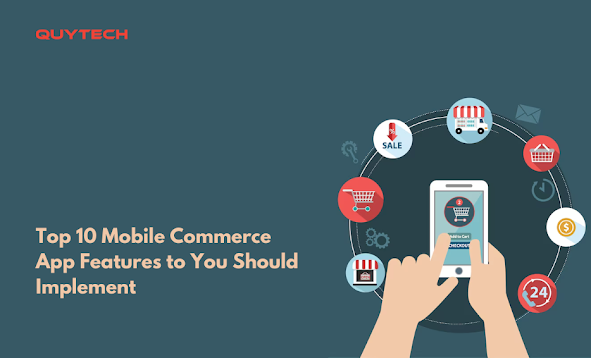Top 10 Mobile Commerce App Features to Yor Should Implement
Mobile commerce, or m-commerce, has become an integral part of the modern retail landscape. With the increasing popularity of smartphones and mobile apps, businesses must leverage the power of mobile commerce to reach and engage their customers effectively. To build a successful mobile commerce app, incorporating essential features is crucial. In this blog post, we will explore the top 10 mobile commerce app features that you should consider implementing to enhance the user experience, drive conversions, and boost customer satisfaction.
1. User-Friendly Interface and Navigation
A user-friendly interface and seamless navigation are fundamental for any mobile commerce app. Ensure that your app has an intuitive layout, clear product categorization, and easy-to-use search functionality. Implementing features like filters, sorting options, and a smooth checkout process will streamline the user journey and enhance the overall shopping experience.
2. Personalized Product Recommendations
Integrating personalized product recommendation algorithms based on user behavior and preferences can significantly improve engagement and conversion rates. By analyzing user data and purchase history, your app can suggest relevant products, upsell and cross-sell items, and create a personalized shopping experience that resonates with individual users.
3. Mobile Wallet Integration
To simplify the payment process, integrating popular mobile wallet options like Apple Pay, Google Pay, or PayPal is essential. Mobile wallet integration provides a secure and convenient payment method, enabling users to make purchases with just a few taps. This feature also helps in reducing cart abandonment rates and improving the overall conversion rate. To develop an Android app, you can connect to the top Android app development company.
4. Seamless Checkout Experience
A seamless and hassle-free checkout experience is crucial for m-commerce success. Implement features such as guest checkout, saved payment information, and one-click ordering to minimize friction during the purchase process. Additionally, allowing customers to track their orders and receive real-time notifications enhances transparency and trust.
5. Social Media Integration
Integrating social media platforms within your mobile commerce app allows users to share products, reviews, and recommendations with their social networks. Social media integration facilitates social proof and word-of-mouth marketing, helping to expand your app's reach and drive user engagement. Consider integrating features such as social login, social sharing buttons, and user-generated content to encourage social interactions and boost brand visibility.
6. In-App Chat and Customer Support
Prompt and efficient customer support is crucial for resolving queries and concerns. Implement an in-app chat feature that allows users to communicate with customer support representatives directly. This real-time communication channel helps address user questions, provide product recommendations, and resolve issues promptly, resulting in improved customer satisfaction and loyalty.
Read blog: Top Mobile App Development Companies
7. Wishlist and Saved Items
Enabling users to create a wishlist or save items for later is a valuable feature. Users can save products they are interested in and easily access them later, increasing the chances of conversion. Additionally, implementing push notifications for price drops or restock updates on saved items can re-engage users and encourage them to make a purchase.
8. Ratings and Reviews
Integrate a ratings and reviews feature to build trust and credibility. User-generated reviews and ratings provide social proof and influence purchase decisions. Implementing a system that allows users to rate and review products helps potential customers make informed choices and encourages them to engage with your app.
9. Order History and Tracking
Offering users access to their order history and tracking information is essential for transparency and customer satisfaction. Users should be able to view their past orders, track the status of their current orders in real time, and receive notifications at every stage of the delivery process. This feature instills confidence in your app and fosters a sense of trust between your brand and the customer.
10. Push Notifications and Personalized Offers
Implement push notifications to keep users engaged and informed about new product launches, discounts, flash sales, and personalized offers. By leveraging user data and purchase history, you can send relevant and timely notifications that resonate with individual preferences. Personalized offers and exclusive discounts create a sense of exclusivity and encourage repeat purchases.
Conclusion
To stay competitive in the mobile commerce landscape, implementing these top 10 features in your mobile commerce app is crucial. A user-friendly interface, personalized recommendations, seamless checkout experience, integration with mobile wallets, social media integration, in-app chat support, wishlist functionality, ratings and reviews, order history and tracking, and push notifications with personalized offers are key elements that enhance user engagement, drive conversions, and foster customer loyalty. By incorporating these features, you can create a compelling mobile commerce app that meets the evolving needs and expectations of your customers in the digital era. You can consult the best mobile app development company to get more information on apps and their other features.




Overall, this blog deserves a standing ovation for its unique content, impeccable writing style, and commitment to delivering value to its readers. I recommend it to anyone seeking reliable information, engaging discussions, and an enriching reading experience.
ReplyDeleteFintech Software Development Companies!